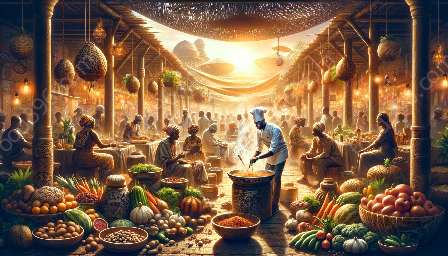Exploring the rich history of African food trade and exchange, and its significant impact on African cuisine evolution and global culinary influences.
African Cuisine History
African cuisine has a diverse and fascinating history that reflects the continent's rich cultural heritage and culinary traditions. The cuisine is deeply rooted in local ingredients, cooking methods, and trade practices that have evolved over centuries.
Cuisine History
The history of global cuisine is marked by trade and exchange, with diverse cultures and regions influencing one another's culinary traditions. The exchange of foodstuffs, cooking techniques, and cultural practices has shaped the development of cuisine worldwide.
Africa's Culinary Heritage and the Impact of Trade
Africa's culinary heritage is deeply intertwined with the continent's history of trade and exchange. The trade networks and routes that connected different regions of Africa facilitated the exchange of foodstuffs, spices, and culinary techniques, contributing to the rich diversity of African cuisine.
Early Trade and the Spread of Ingredients
Historical records indicate that trade in foodstuffs and agricultural products played a significant role in shaping African cuisine. For example, the trans-Saharan trade routes facilitated the exchange of goods such as salt, gold, and spices, which brought new ingredients and flavors to different regions of Africa.
Colonial Influences and Culinary Exchange
During the colonial period, European powers established trade relationships with African societies, introducing new crops, cooking techniques, and culinary traditions. This exchange resulted in the fusion of African and European flavors, giving rise to unique dishes and flavor profiles within African cuisine.
Impact of African Food Trade on Global Cuisine
The trade and exchange of African foodstuffs have had a profound impact on global cuisine. Ingredients such as yams, okra, peanuts, and spices such as pepper and cloves have been incorporated into diverse culinary traditions around the world, enriching the global gastronomic landscape.
African Food Trade in the Modern Era
Today, African food trade continues to play a significant role in shaping global cuisine. The export of products like cocoa, coffee, and spices from Africa sustains the supply chains of many international markets, contributing to the diversity and richness of culinary experiences worldwide.
Conclusion
The history of African food trade and exchange has left an indelible mark on the continent's cuisine, contributing to its diversity and richness. From the early trade routes to the modern export industry, African food trade continues to shape global cuisine and influence culinary practices around the world.

